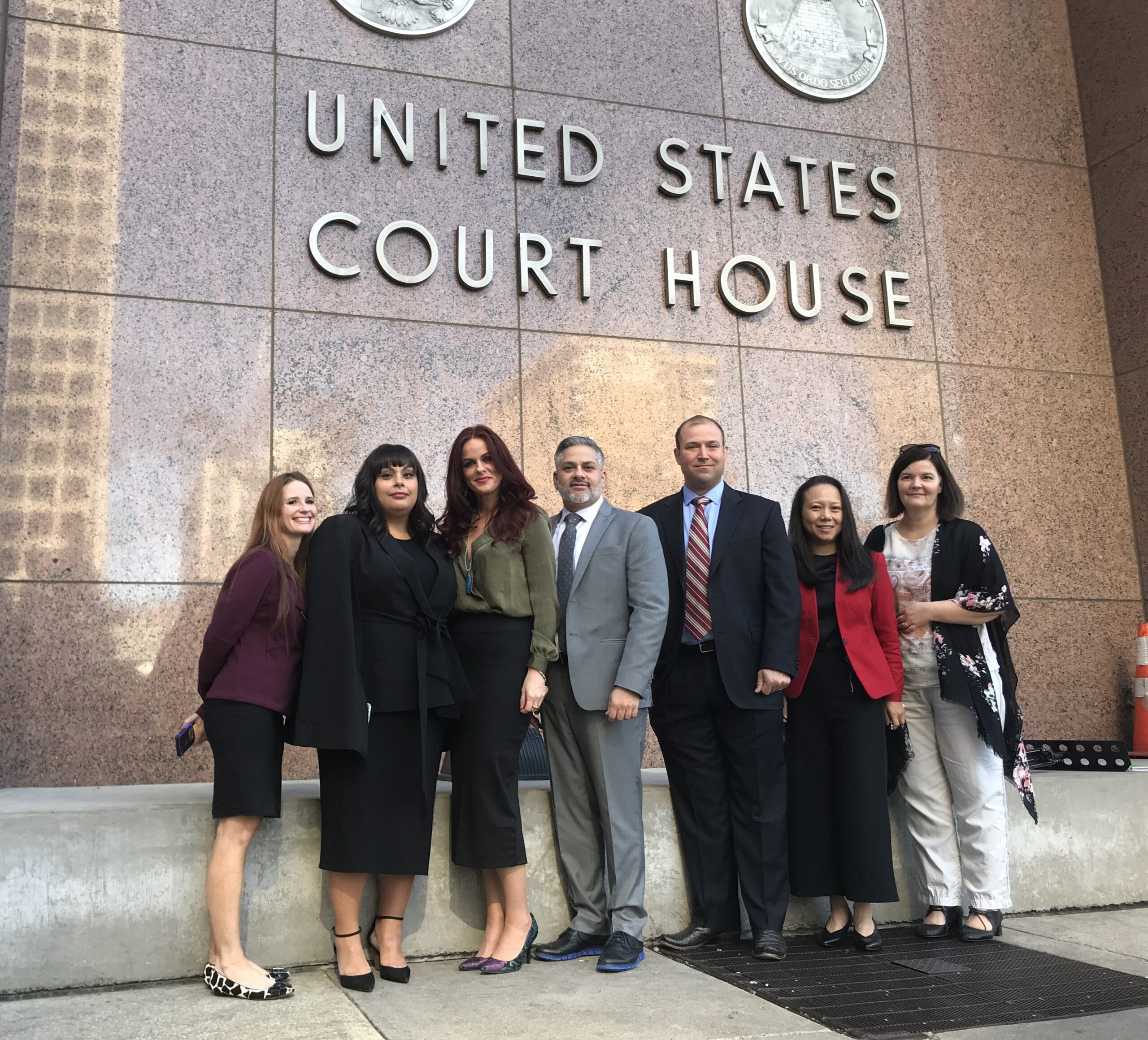
{6 minutes to read} In addition to employment discrimination the firm practices wage and hour litigation. Wage and hour litigation is mostly comprised of two separate violations, minimum wage and overtime. The Fair Labor Standards Act (FLSA) and the New York Labor Law (NYLL) delineate the rules for employers regarding paying Minimum Wage and Overtime.Continue reading
SCOTUS Finds Leniency in Exhausting EEOC Administrative Filing Requirements

By: Aimee Christianson and Shaloni Pinto
{Read in 4 minutes} On June 3, 2019, the Supreme Court released their decision in the case Fort Bend County v. Davis [No. 18-125], which involves Equal Employment Opportunity Commission (EEOC) claim filing disagreements. This case involves Title VII of the Civil Rights Act of 1964 and a potential complainant’s administrative requirements with the EEOC.Continue reading
Workplace Discrimination or Harassment? What Should You Do!!
 {Read in 6 minutes} Recently I posted an article reminding employees that they must file a harassment complaint within 180-300 days after the latest occurrence. While working on that blog, the question came up about what an employee should do if they are the victim of harassment.
{Read in 6 minutes} Recently I posted an article reminding employees that they must file a harassment complaint within 180-300 days after the latest occurrence. While working on that blog, the question came up about what an employee should do if they are the victim of harassment.
Report the Behavior
First and foremost, report the questionable behavior to someone in your Human Resources (HR) department. The company is not expected to have eyes and ears everywhere; internally, most of them require their employees to report incidents, and the law also requires employees to report incidents themselves.Continue reading
Workplace Discrimination? Get that Complaint Filed!
Employees in this country have protections against workplace discrimination and harassment. These include protection from sexual or racial harassment, national origin, religion, age, disability, and gender (including sexual orientation) discrimination. These forms of harassment and discrimination are spelled out under Title VII, and its amendments, which is the statute enacted as a result of the Civil Rights Act of 1964.

Prior to that time, there had been other federal statutes such as §1981 and §1983 which address primarily race and national origin discrimination as well as retaliation. These sections, however, did not include gender, religion, disability, or age discrimination. As a result of the civil rights movement, the Civil Rights Act was passed, which was designed to specifically address workplace discrimination and expanded protections for employees subjected to these additional types of discrimination.
The Title VII statute empowered what is known as the Equal Employment Opportunity Commission (EEOC) and created that faction of the government whose job it is to survey and take complaints of workplace discrimination. Anyone wanting to bring a complaint and go into Federal court under those claims has to first go through the EEOC administrative process. As a federal statute, it is the same in every state and any employer who has 15 employees or more is subject to the statute.
The EEOC Filing Deadline
Title VII sets a complaint filing deadline of 180 calendar days. However, it also provides that in any state where there is a similar employment discrimination statute, such as New York, the deadline may be expanded to 300 days. With the exception of a few states like New Mexico and Georgia, every state in this country has a state-level statute against workplace discrimination. In those states that do not, the filing period is limited to the 180 days.
A complaint must be initiated when the harm takes place. You can’t have something happen two years earlier and then wait, worrying whether you are going to lose your job. That is certainly a legitimate worry, but if you choose to wait and try to raise that complaint after the 180-300 days have passed, it will be considered untimely because the statute requires you to make that complaint within 180-300 days of the occurrence of discrimination.
However, certain claims trigger the 180-300 day filing requirement after the last occurrence of discrimination where the discrimination takes place over a period of time. This type of discrimination is known as a “continuous violation.” For example, if you are a victim of sexual harassment and you were subjected to repeated, unwanted sexual advances or comments over a period of months, the clock starts running from the last act of harassment, not the first. Most employees do not know this.
If you believe you have a legitimate complaint, it is extremely important that you make use of resources like the EEOC’s website, or contact a lawyer like us to ask for information about what to do, even if you choose not to act on it at that time. Failing to act in many states leaves you high and dry, without any other protection, because either there is no state statute, or in more conservative jurisdictions like Texas, for example, the states only adopt the same 180-day rule as Title VII.
Paying attention to the EEOC deadlines is an important issue because an employee may have a very strong legal claim but if they do not act within a certain period of time, or get the information to act within a certain period of time, their claim may be completely barred leaving you with no avenue for justice.
James A. Vagnini
Partner
email: [email protected]
Supervisor sues Omni hotels, alleging sexual harassment and retaliation when she reported it
Weight Discrimination: The Issue of the Future?
 What do you think of when you think “employment discrimination?” The major civil rights victories of the 1960s are characteristically thought of as racial battles. The Civil Rights Act of 1964 was seen largely as a victory for Americans of color. The Act was preceded in 1963 by the Equal Pay Act, which sought to guarantee equal pay for women. Both laws include broad, sweeping reform in terms of race, gender, nationality and religion.
What do you think of when you think “employment discrimination?” The major civil rights victories of the 1960s are characteristically thought of as racial battles. The Civil Rights Act of 1964 was seen largely as a victory for Americans of color. The Act was preceded in 1963 by the Equal Pay Act, which sought to guarantee equal pay for women. Both laws include broad, sweeping reform in terms of race, gender, nationality and religion.
In the 2010s, it appears as if new civil rights issues are finally culminating in American culture, especially the legal system. This coming election will be key to the future of gay rights, the most talked about social issue of the day.
One other civil rights issue is emerging, however, that was rarely spoken of in the 1960s: obesity. With claims of discrimination based on weight and size on the rise, what’s the future of civil rights for overweight Americans?
Is it Legal to Discriminate Based on Weight?
Currently, there are no laws on the books which protect the obese from discrimination. However, it is becoming common to use the Civil Rights Act of 1991 as a platform for obesity rights. The law opens the possibility for obesity-related discrimination cases along several metrics. For instance, if an individual was discriminated against, and his/her obesity is disease-related, then illegal discrimination may have taken place. Obesity discrimination may or may not be race related in some cases, as obesity rates are statistically higher among Latinos and African Americans.
Did Title VII Leave Obese Individuals Out?
There’s no question that obesity is on the rise in the United States. There’s very little question that popular culture in the U.S. glorifies the skinny, the healthy, and the glamorous. It is profoundly ironic to see advertisements for popular fast food restaurants like McDonald’s and Carl’s Jr. featuring supermodels with hamburgers—and it is profoundly illustrative of America’s double standard in terms of exploitation of–and discrimination against–the obese.
The Exception to the Rule
One state in the Union protects against obesity-related discrimination: Michigan. Conversely, the state also passed a law protecting fast food restaurants from being sued over obesity. Other states are known to have considered enacting laws protecting the obese.
If you feel you have been discriminated against because of your weight, especially in the realm of employment, you should consider your legal options. Call the law offices of Valli Kane & Vagnini today for a free consultation.
Employment Law and Pregnancy Discrimination
Telling Your Employer About Your Pregnancy
 When you are pregnant, you may wonder when and how you are going to tell your employer. The fact is under the Pregnancy Discrimination Act, and other laws against discrimination, you do not have to tell your employer at all. If you can perform your work and do it well, and do not need special accommodations, your pregnancy is legally irrelevant.
When you are pregnant, you may wonder when and how you are going to tell your employer. The fact is under the Pregnancy Discrimination Act, and other laws against discrimination, you do not have to tell your employer at all. If you can perform your work and do it well, and do not need special accommodations, your pregnancy is legally irrelevant.
The Pregnancy Discrimination Act
The Pregnancy Discrimination Act prohibits employers with more than 15 employees from discriminating against pregnant employees.It also includes local and state government employees, federal employees, employment agency employees and labor organization employees no matter how many employees they have.
Pregnancy Discrimination and Benefits Employers must provide the same benefits to all their employees whether they are pregnant or not. This includes health insurance, retirement and disability benefits. Medical conditions related to pregnancy must be covered identically to other medical conditions.Pregnancy Discrimination and Disability If a pregnant woman can do her job for a while due to a medical condition related to her pregnancy or childbirth, the employer must treat it like any other temporarily disabled employee. This means that the employer must make accommodations or provide disability leave.More Rules on Pregnancy Discrimination
- A potential employer may not ask a pregnant job candidate any questions they would not ask a candidate that was not pregnant.
- An employer may not discriminate against an employee who might get pregnant.
- An employer may not forbid a pregnant employee from doing a job for which she is fit and she wants to do.
- Jobs must be held open for pregnancy related absence for the same amount of time as for other sickness and disability.
- Employers cannot discriminate against an employee who has had an abortion or is considering getting an abortion.
- Female spouses of male employees must be provided the same level of medical benefits than the male spouses of female employees.
- Single women must be provided the same pregnancy related benefits as married women.
- Seniority, vacation, raises, promotions and other accrued benefits for pregnant women must be granted in the same way as those on leave for non-pregnancy reasons.
If you believe you may have been a victim of pregnancy discrimination due to pregnancy, childbirth or a pregnancy related medical condition, you should consult with an employment attorney as soon as possible. A reputable employment discrimination lawyer will listen to your situation and educate you on the pregnancy discrimination laws. If you have been a victim of pregnancy discrimination an experienced employment attorney can help you recover any damages you have incurred.
The Fair Employment Opportunity Act of 2011 – Eliminating a Catch-22

NYC employment attorneys have pointed out that the Equal employment Opportunity Commission (EEOC) held a public hearing. A disturbing trend triggered this hearing. Several companies had been discriminating against job applicants who were unemployed. These job applicants had been excluded from any hiring consideration. Some even ran ads saying that a candidate would only be considered if employed. Ads would have statement like “Unemployed candidates will not be considered at all” or “No candidate will be considered by client if not currently employed, whatever the reason.” The same NYC employment attorneys also point that however disturbing and discriminatory this may seem, it is legal. At least for now.
The Fair Employment Opportunity Act of 2011 is designed to prohibit employers and employment agencies from using unemployment as a sole factor to screen out or exclude job candidate.
In this time of severe recession, many workers are merely victims of the economy. However, as NYC employment attorneys have noted, many employers hang on to the outmoded idea that unemployed people are somehow damaged, are poor workers and weak links.
Employers and staffing firms are not correcting this issue on their own. In fact, the NELP says that these firms are continuing to deny job openings to unemployed candidates.
This is a demoralizing double whammy to those who have lost a job and learn they will not be considered for new openings because they are not working. This old Catch 22 states that you have to have a job to get a job. The fact is there are currently highly qualified, skilled, experienced workers who cannot seem to get their foot in the door because they lost a job through no fault of their own. The NYC employment attorneys state that this makes no sense from a business standpoint.
The Fair employment Opportunity Act of 2011 is designed to stop employers and employment agencies from discriminating against job candidates who are not working. The job search environment is already tough. The Bureau of Labor Statistics states that there is one job opening for every five unemployed workers and the job crises has a long way to go.
The NYC employment attorneys are confident that this new legislation will eliminate the discriminatory practices that are making a long term unemployment problem even worse. Apparently, this legislation has strong support and, if enacted, unemployed job candidates should get a fairer shot at job openings.
Employment and the Expansion of Disability Claims
 The rules issued by the Equal Employment Opportunity Commission (EEOC) expand the protection granted employees under the Americans with Disabilities Act (ADA). These rules were authorized by the ADA Amendments (ADAA) and were passed by Congress in 2008. The results are a significant expansion of the number of individuals claiming ADA protection.
The rules issued by the Equal Employment Opportunity Commission (EEOC) expand the protection granted employees under the Americans with Disabilities Act (ADA). These rules were authorized by the ADA Amendments (ADAA) and were passed by Congress in 2008. The results are a significant expansion of the number of individuals claiming ADA protection.
Americans with disabilities are a large and economically disadvantaged group. The goals of ADA mandates are similar to civil rights. One goal is to make sure people with disabilities have access to employment. In the past, employers traditionally shut out disabled people from employment. A second goal is to increase job opportunities for disabled. As a group, people with disabilities earn less than people without disabilities. Employers that will be affected. Employers that employ 15 or more employees who work for at least twenty calendar weeks within a year. The EEOC points out that tracking this can become rather complicated and recommends staying in close communication to ensure compliance. Broad is the protection. The ADAA has expanded the definition of “disability”. As a result, employees will have a much easier time when seeking the law’s protection.
Do I fall under this broad coverage? According to the EEOC, an individual with a disability is a person who:

- Has a physical or mental impairment that substantially limits one or more major life activities;
- Has a record of such an impairment; or
- Is regarded as having such an impairment.
The key is how limited you are in performing your major life activities. For example, doctors may have diagnosed you as being clinically depressed. However, you may not be qualified for coverage because you are not substantially limited in performing major life activities.
What are my rights?If you are covered under the ADA, your employer must make “reasonable accommodations” as long it does not cause the employer “undue hardship”. Undue hardship for the employer means it would cause significant difficulty or expense. Reasonable accommodation can take many forms, but some common examples are included here:
- Part time and job sharing
- Flexible schedules
- Time off for doctor’s appointments, support groups and therapy
- Flexible break time to meet individual needs
- Additional leave time

Filing a Charge. If you think an employer has discriminated against you because of your disability, you may file at the nearest EEOC office or find an experienced employment attorney. If you have no office in your area, it can usually be over the phone.




